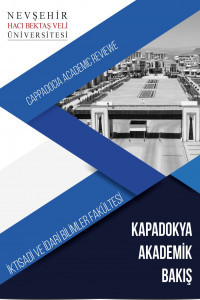POST-BREXIT, POST-POPULISM: WHAT SCENARIOS FOR EUROPE?
Three significant events have taken place in recent months of the year 2017. First, in Rome, the celebration of the 60th anniversary of the signing of the Treaty of Rome, where the President of the Commission presented the White Paper on the Future of Europe (European Commission, 2017), considering the continuation of the European construction in a differentiated way (multi-speed Europe). This event was followed, in May 2017, by the victory of Emmanuel Macron in the French presidential election on the basis, in particular, of a pro-European program claimed to promote enhanced cooperation with plans to create a ministry Eurozone finances, the creation of a fund for the financing of digital innovation, strenghtenig the EU defence and intelligence. Its pro-European commitment seems to have temporarily put an end to the EU bashing (Delaume & Cayla, 2017) that could be read in the press and heard in the speeches of many politicians in Europe. This commitment, announced during a speech at the Humboldt University in Berlin in January 2017 was confirmed, the third milestone event, by two speeches, one in Athens, the other at the Sorbonne in September 2017 which spell out the vision of the new President to engage Europe in a federal leap.
Anahtar Kelimeler:
post-brexit, European union, referendum of Great Britain
POST-BREXIT, POST-POPULISM: WHAT SCENARIOS FOR EUROPE?
Three significant events have taken place in recent months of the year 2017. First, in Rome, the celebration of the 60th anniversary of the signing of the Treaty of Rome, where the President of the Commission presented the White Paper on the Future of Europe (European Commission, 2017), considering the continuation of the European construction in a differentiated way (multi-speed Europe). This event was followed, in May 2017, by the victory of Emmanuel Macron in the French presidential election on the basis, in particular, of a pro-European program claimed to promote enhanced cooperation with plans to create a ministry Eurozone finances, the creation of a fund for the financing of digital innovation, strenghtenig the EU defence and intelligence. Its pro-European commitment seems to have temporarily put an end to the EU bashing (Delaume & Cayla, 2017) that could be read in the press and heard in the speeches of many politicians in Europe. This commitment, announced during a speech at the Humboldt University in Berlin in January 2017 was confirmed, the third milestone event, by two speeches, one in Athens, the other at the Sorbonne in September 2017 which spell out the vision of the new President to engage Europe in a federal leap.
Keywords:
Post-brexit, Brexit European Union, Referendum of Great Britain, Economic and Monetary Union,
___
- Reference
- Artus Patrick, Marie-Paule Virard (2017) : Euro. Par ici la sortie ? Paris, FayardBerend , Ivan T. (1996): Central and Eastern Europe, 1944-1993. Detour from the Periphery to the Periphery, Cambridge, CUPCoralie Delaume, David Cayla (2017): La fin de l’Union européenne, Paris, MichalonDiscours du Président de la République, Emmanuel Macron, à la Pnyx, Athènes le jeudi 7 septembre 2017 , Elysee.frEuropean Commission (2017): White Paper on the future of Europe. Reflections and scenarios for the EU27 by 2025, Brussels, EUGlenny Misha (2012): The Balkans. Nationalism, War and the Great Powers. 1802-2012. Londres, GrantaJuncker Jean-Claude (2017) : Discours sur l'état de l'Union 2017, Bruxelles, Commission européenne, le 13 septembre 2017Richet Xavier (2016): “Regional Development and Intra-Firm Networks in the Enlarged European Union: the Role of Foreign Direct Investment”, in Xavier Richet& Srdjan Redzepagic (2016): Western Balkans Integrating in the EU: Challenges, Policies, Issues, Nice, CEMAFI internationalRichet Xavier (2017): “L’initiative Belt and Road” in Recherches internationales, août-septembreBalkans in Europe Policy Advisory Group: (2014): The Unfullfilled Promise. Completing the Balkan Enlargement Centre for Southeast European Studies , University of GrazThe Balkans in Europe Policy Advisory Group (2017): The Crisis of Democracy in the Western Balkans. Authoritarianism and EU Stabilitocracy, Centre for Southeast European Studies, University of GrazThe Economist (2017): The Future of the European Union, Special Report, March 25thWolf Martin (2017): “Emmanuel Macron and the battle for the Eurozone” Financial Times 17/05/2017Commission européenne (2017): Le livre blanc sur l’avenir de l’Europe. Cinq scénarios, Bruxelles, Commission européenne
- ISSN: 2602-3474
- Yayın Aralığı: Yıllık
- Başlangıç: 2017
- Yayıncı: Nevşehir Hacı Bektaş Veli Üniversitesi
Sayıdaki Diğer Makaleler
POST-BREXIT, POST-POPULISM: WHAT SCENARIOS FOR EUROPE?
FİNANSAL PERFORMANSIN DEĞERE DAYALI ÖLÇÜLMESİNDE HİSSEDAR KATMA DEĞERİ (SVA) YAKLAŞIMI
Nizamettin BAŞARAN, Eyyüp Ensari ŞAHİN
FELDSTEIN-HORIOKA PUZZLE FOR BRIC COUNTRIES
Kemalettin TANRISEVEN, Lütfi BİCİMVEREN
FİNANSAL GELİŞME VE YENİLİK (İNOVASYON): TÜRKİYE ÜZERİNE AMPİRİK BİR ARAŞTIRMA
